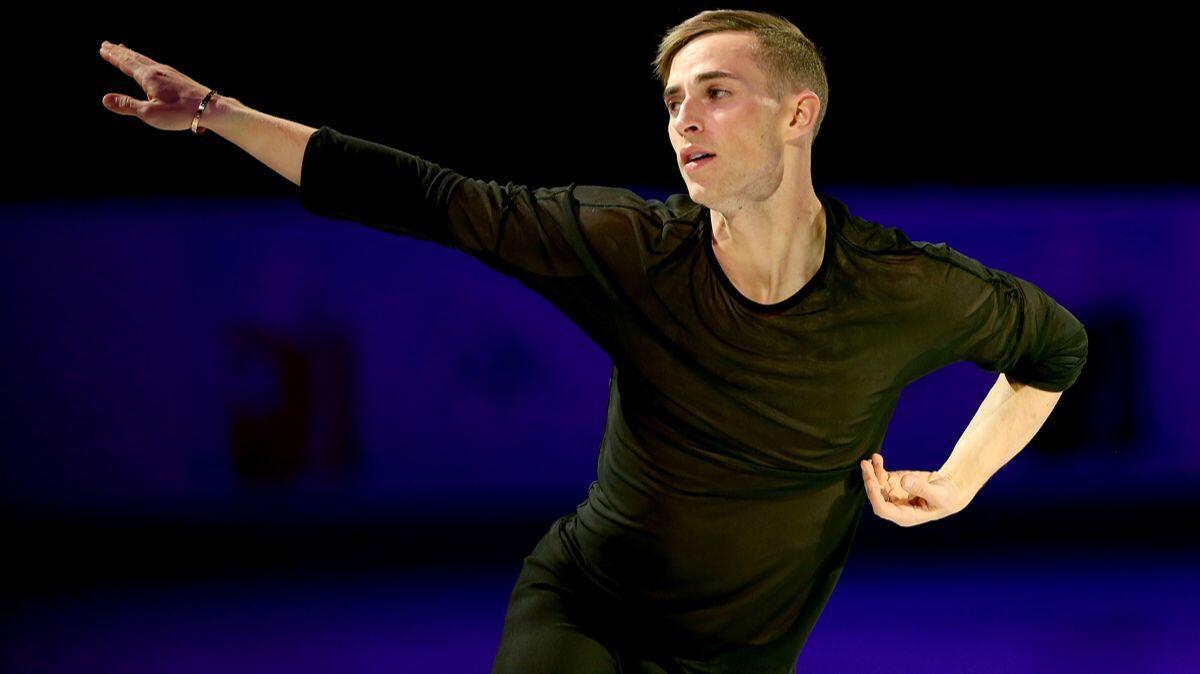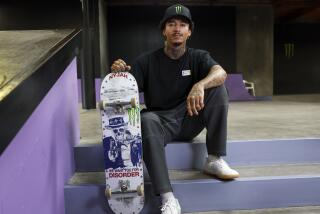Column: Adam Rippon, openly gay, overcomes bullying and self-doubt to earn a spot on the U.S men’s Olympic skating team

Adam Rippon stood 4 feet tall when he was in the third and fourth grade in Scranton, Pa., making him an easy target for bullies. He started to skate when he was 10 and found a creative outlet for his energy, but he had no role models to show him how to act or talk or fight back when he was taunted.
“Being a small gay kid from the middle of nowhere, Pennsylvania, is a hard way to grow up,” he said.
Rippon tried to change his mannerisms to be “normal,” but he couldn’t pretend to be something he was not. Skating was his refuge. “I finally found something that was made for somebody like me and that I loved to do,” he said. But it’s an expensive sport, and as he grew older he had to pay his expenses himself. His coach, Rafael Arutunian, helped by co-signing his car lease and allowed him to defer paying for lessons, but Rippon’s difficulties went beyond finances. Despondent and feeling depressed after he didn’t make the U.S team for the 2014 Sochi Olympics, Rippon nearly quit the sport.
“For a really long time I’d look in the mirror and I wouldn’t know who was looking back at me and I wouldn’t really like who was looking back at me, and it took me a really long time to own who I was,” he said. “And when I was able to own who I was, that’s when I had my most success.”
Rippon, 28, came out publicly as gay in late 2015. He had already come out to his parents and five siblings, one at a time. “It was so liberating for me,” said Rippon, who won the U.S. championship in 2016, “and I saw that my skating could be something greater than just for me. That’s what reinvigorated my passion for doing what I love to do.”
Rippon, who trains at The Rinks-Lakewood Ice, is an artist in a sport that’s infatuated with quadruple jumps and undervalues musicality and pure skating. That emphasis almost cost him one of three U.S. men’s singles berths at the Pyeongchang Olympics after he committed several uncharacteristic errors in his free-skate program at the U.S. championships last week in San Jose and dropped behind Nathan Chen, Ross Miner, and Vincent Zhou. He endured some nervous moments until a U.S. Figure Skating selection committee chose Rippon over Miner based on each skater’s body of work over the past year, using criteria that had been established a year ago.
It was a difficult decision but the correct one. Miner’s long program was enthralling, but Rippon has the better resume. Unlike some Olympic sports, including track and field and swimming, the U.S. figure skating championships aren’t a one-shot Olympic trials. “We feel have a very strong team, the right team, based on the selection criteria,” said Samuel Auxier, president of U.S. Figure Skating.
Soon after Rippon, Chen and Zhou were told they will go Pyeongchang, Rippon texted Miner to offer sympathy. Rippon was buoyed to hear Miner was happy for him. “We’ve been friends for a really long time and we’ve had a lot of circumstances similar to this but not at the same extreme as the Olympics,” Rippon said.
Rippon had been terrific in his short program and earned higher program component scores than Chen, his training mate at Lakewood Ice. The program component scores grade skating skills, transitions, performance, composition and interpretation of the music; jumps and spins have set values and are accounted for in the total element score. Chen had a higher total element score because he got full credit for two quadruple jumps.
In the long program, Chen and Zhou each attempted five quadruple jumps and Rippon tried one, under-rotating and falling on a quadruple lutz. He later “popped” two jumps, downgrading in mid-air from planned triples to single jumps. He hoped his strong record would persuade the selection committee to give him the Olympic berth, but he wasn’t entirely sure. Still, he was content to live with the committee’s decision.
“When I finished [Saturday] I had a moment where I said, ‘You know what, I’m so grateful that no matter what, I continued to skate because I am such a stronger person and I’m a lot braver than I thought I ever could be,’” he said.
Rippon gives balance to the U.S. men’s singles delegation. He’s expressive and mature; Chen and Zhou are phenomenal jumpers. Chen, who has the best chance among the three to win an Olympic medal, said he was happy about Rippon’s selection. “I’ve trained with Adam for the past six years and honestly it’s been so inspiring to be able to skate with him and train so hard,” said Chen, 18. “Honestly, he’s so deserving of this Olympic spot. We both push each other. I probably wouldn’t be the skater I am without him by my side.”
Zhou, 17, also sees Rippon as a wise elder. “I think it’s good to have someone who’s very experienced on the team along with, as many people would say, the young talents like Nathan and I,” Zhou said. “He’s very deserving.”
Hearing that praise, Rippon joked about his age. “I’m so excited that my two sons are doing so well. I’m honored to be their father,” he said.
But he doesn’t joke about being bullied because he was different from the other kids. Coming out as gay is still difficult for competitors. Some, like 1988 Olympic gold medalist Brian Boitano, have come out after their careers ended.
“In this sport it’s taboo. There’s sort of this idea that you’re skating so you’re just gay and when you’re young you try so hard to not fit into that stereotype and you kind of repress that. I don’t want to be like that,” Rippon said. “I think there’s sometimes a push for the normal boy next door and I’m definitely not the boy next door….I think some people are afraid to come out, in all sorts of sports. Gay people aren’t just in figure skating. They’re in all sorts of places because they’re just people.” Being gay, Rippon said, “is not something that defines me. It’s just a part of who I am and I think it’s part of the way that I express myself and just part of what makes me, me.”
He has been defined by his artistry and perseverance. Now, he can further define his career at the Olympics. “This is what I’ve been working for my whole life,” he said. “I’m thrilled.”
Follow Helene Elliott on Twitter @helenenothelen
More to Read
Go beyond the scoreboard
Get the latest on L.A.'s teams in the daily Sports Report newsletter.
You may occasionally receive promotional content from the Los Angeles Times.






